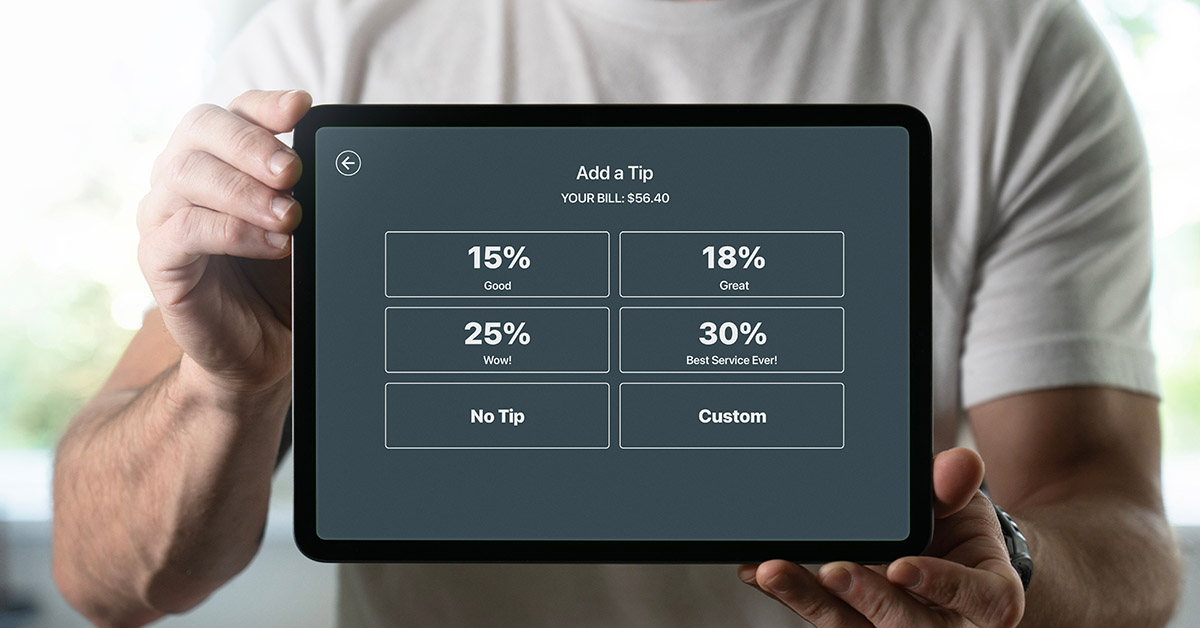Tipping has always been a controversial subject, but recently it seems to have caused more debates than ever.
With increasing costs, changing expectations, and assessing opinions on fair compensation, the question is whether Tipping is still relevant – or even reasonable – has many people on the edge. Some tilt of the claims is an essential part of securing adequately paid workers, while others claim to have become a system that is outdated and even out of control.
One of the people who took a bold attitude against the overrun culture is Dustin Anderson, who recently announced to his followers that it was with practice. His words set fire to heated debates and discussions about the real purpose of overturning and whether she had lost her way.

The culture of tips has become a questionable problem in recent years, especially in the US and parts of Europe. What once began as a simple way to reward exceptional service has evolved into a comprehensive and often confusing practice, which led some people to question his justice. While Tipping may be a way to prove the valuation for the services provided, has become more controversial, some of which made some of the system to question the system completely.
Shift in anticipation of overturning.

Dustin Anderson, a social media user, recently produced waves when he announced that there was an overturning. He claimed that Tipping was originally supposed to reward “exceptional service” but questioned, “When was the last time you got an exceptional service anywhere?”
Anderson explained that while he believes that he pays sufficiently for his food to ensure that workers can earn a habitable wage, expectations of tips – especially high percentages – will be unduly created. He expressed frustration from common practice automatically designing tips 20 to 25 percent and said, “You did your job. You brought me food and I paid for it. In addition, I do not owe you because of expectations. ”
A divided view of overturning
Anderson’s views have triggered mixed reactions. Many of them agree with his perspective, especially those who are frustrated by tilting the requirements for services such as collection or coffee. One user shouted: “Tipping is out of control” while others criticized being asked for a tip for services that felt they would not guarantee a special payment. “Why should I tilt coffee $ 6?” asked another.
At the same time, there are people who believe that Tipping remains an important part of the compensation of the service industry. Some argue that the system should be introduced to support workers, especially those in low-wage positions.
One commentator was thinking about the fighting of former servers and stated that in some cases the employees had to pay part of their sale to the restaurant, even if they did not receive tips. Others suggest that everyone should work in the service industry at a certain point in order to better understand the hard work that goes into work.
The problem today with tilting
Dustin is not alone in criticizing culture, which has often led to situations such as food supplies that cancel orders or destruction of food if there is no tip. Increasing expectations of overturning for each service, regardless of efforts, caused many to feel amazed by practice. For example, some have decided not to incline their hairdressers, which justifies that they do not withdraw the same overhead costs as the traditional owners of businesses, especially if they work from home.
Dark History Behind the Hill
While Tipping can be a way to express gratitude for excellent services, its history is less simple. Tipping, which was introduced in Europe, initially faced US resistance because of its connection with inequality.
This practice spread in the US at a time when restaurant owners were able to hire workers, often black women, at low wages, which further maintained an unfair system. Interestingly, Tipping is not so common in many European countries, where workers usually pay life wages and tips are already included in the price of the law. This ensures fair compensation for workers and transparency for customers.
Given that the unloading culture is constantly evolving, it remains clear that many people like Dustin believe that the system needs reform. Finding a balance between fair compensation for workers and adequate expectations of customers remains a challenge and only time will show whether significant changes will occur.
Resources:
“One divides his opinion after he said he was already refusing to tip.” Joe Co. Callum Boyle 1 February 2024.
“The cancellation history of overturning in the U.S.:” It is literally a slave wage “.” CBS. Taylor Mooney. 30 March 2020.
“Will you put the hairdressers wrong?” TikTok caused a huge debate. “HuffPost. Brittany Wong. 16 February 2024.
In conclusion, the debate surrounding the culture of tilting is far from over, with strong opinions on both sides of the argument. While some, such as Dustin Anderson, claim that overturning has become excessive and disconnected from the original purpose of remuneration of exceptional services, others continue to support this practice as a fundamental form of compensation for workers, especially in the service industry. Thanks to its complex history and developing expectations, it is clear that tipping is a problem that requires careful reassessment. Finding a balance between fair wages, adequate expectations of customers and meaningful rewards for service remains a challenge, but it is an unlikely conversation that will not soon disappear.



